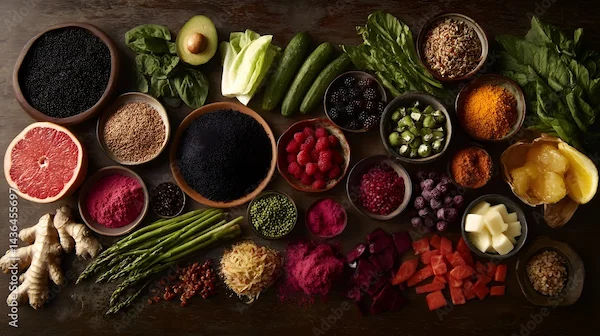Debunking Myths About Chocolate Health Benefits
This article will debunk some common myths about chocolate and give you the real facts on its health benefits and risks. By the end, you'll have practical tips to make smart choices about including chocolate in your diet.

Written by
Last updated on 3rd Jul, 2025
Introduction
Chocolate has been a beloved treat for centuries, often associated with indulgence and pleasure. However, its health effects have been a topic of much debate. From claims of miraculous benefits to warnings of dire consequences, the truth about chocolate lies somewhere in between.
Myth 1: Chocolate Has No Health Benefits
Reality: Not all chocolate is created equal, but dark chocolate, in particular, is known for its health benefits. Rich in flavonoids, dark chocolate is a potent antioxidant that can help improve heart health by reducing blood pressure and improving blood flow. These antioxidants also play a role in lowering LDL (bad) cholesterol levels and reducing inflammation.
Moreover, dark chocolate contains essential minerals such as magnesium, iron, and zinc, contributing to overall well-being. When consumed in moderation, dark chocolate can be a valuable addition to a balanced diet.
Myth 2: Cocoa Butter Is Bad for You
Reality: Cocoa butter, a key ingredient in chocolate, is often misunderstood. While it is true that cocoa butter contains saturated fats, not all saturated fats are harmful. Cocoa butter is rich in stearic acid, a type of saturated fat that does not raise cholesterol levels. In fact, stearic acid has been found to have a neutral impact on heart health.
Furthermore, cocoa butter contains oleic acid, a monounsaturated fat also found in olive oil, which is known for its heart-protective properties. Thus, cocoa butter can be part of a healthy diet when consumed in moderation.
Myth 3: White Chocolate Is Not Real Chocolate
Reality: White chocolate often gets a bad rap for not being "real" chocolate. While it lacks cocoa solids, which give chocolate its characteristic flavor and color, white chocolate does contain cocoa butter. Cocoa butter is derived from the cocoa bean, making white chocolate a legitimate form of chocolate. However, it is worth noting that white chocolate is typically higher in sugar and fat compared to dark chocolate, so moderation is key.
Myth 4: Chocolate Is Inherently Fattening
Reality: Chocolate itself is not inherently fattening; it is the calorie content and portion sizes that matter. Dark chocolate, for example, is energy-dense, meaning it contains a high number of calories in a small portion. Consuming large quantities can contribute to weight gain, but enjoying a small piece of dark chocolate can be part of a healthy diet.
The key is to practice mindful eating. Savoring a small piece of high-quality dark chocolate can satisfy your sweet tooth without leading to overindulgence.
Myth 5: Chocolate Causes Acne
Reality: The belief that chocolate causes acne is a common misconception. Scientific studies have not found a direct link between chocolate consumption and acne. However, the sugar and dairy content in certain chocolate products can contribute to inflammation, which may exacerbate acne in some individuals.
If you are prone to acne, it may be beneficial to opt for dark chocolate with lower sugar content and avoid milk chocolate and other sugary confections.
Myth 6: Chocolate Causes Headaches
Reality: While some individuals may experience headaches after consuming chocolate, it is not a universal trigger. The cause of headaches can vary widely, and for most people, chocolate is not a culprit. Factors such as caffeine sensitivity, food additives, and overall diet are more likely to trigger headaches.
If you suspect that chocolate is a trigger for your headaches, try keeping a food diary to identify potential patterns and consult with a healthcare professional for personalized advice.
Myth 7: Chocolate Is Addictive
Reality: The idea that chocolate is addictive stems from its pleasurable taste and the release of feel-good chemicals in the brain, such as serotonin and endorphins. While these effects can lead to cravings, chocolate is not considered an addictive substance in the same way as drugs or alcohol.
Practicing moderation and mindfulness when consuming chocolate can help you enjoy its benefits without overindulgence.
Myth 8: Chocolate Is a Superfood
Reality: While dark chocolate has numerous health benefits, it is essential to approach the term "superfood" with caution. A superfood is typically defined as a nutrient-rich food considered especially beneficial for health and well-being. Dark chocolate fits this description to some extent, but it is not a magic bullet for health.
A balanced diet that includes a variety of nutrient-dense foods such as fruits, vegetables, whole grains, and lean proteins is crucial for overall health. Dark chocolate can complement such a diet but should not be relied upon as a sole source of nutrition.
Tips for Including Chocolate in a Healthy Diet
Adding chocolate to a healthy diet can be a truly enjoyable experience. Even though chocolate often gets labeled as a guilty pleasure, it can actually provide a range of health benefits when consumed thoughtfully and in moderation. To help you fully appreciate chocolate's deliciousness without affecting your wellness, here are a few tips:
Choose Dark Chocolate: When it comes to enjoying chocolate, opt for dark chocolate with a high cocoa content—70% or higher is ideal. Dark chocolate is rich in flavonoids, which are powerful antioxidants that can help improve heart health, reduce inflammation, and provide other health benefits. Higher cocoa content also means less room for added sugars, making dark chocolate a healthier choice compared to milk or white chocolate.
Mind Portion Sizes: It’s easy to get carried away with chocolate, but moderation is key to reaping its benefits without the drawbacks. Enjoying small portions of chocolate can help you avoid excessive calorie intake. A couple of squares of high-quality dark chocolate can be incredibly satisfying without leading to overindulgence. Remember, savoring a small piece slowly can be more enjoyable than mindlessly eating a larger portion.
Practice Mindful Eating: Mindful eating is all about paying attention to what and how you eat. Rather than just grabbing a chocolate bar on the run or mindlessly munching while watching TV, slow down and truly savor each bite. Pay attention to the rich flavors and smooth textures. Treat chocolate as a special indulgence, not an everyday habit. This mindful approach can not only make the experience more enjoyable but also help prevent overeating.
Combine Chocolate with Healthy Ingredients: Get creative with how you incorporate chocolate into your diet. Consider pairing dark chocolate with nutrient-rich foods like nuts, seeds, or fruit. For example, a handful of almonds with a few squares of dark chocolate makes for a balanced and satisfying snack. Or try adding a sprinkle of cocoa nibs to your morning oatmeal for a delicious and healthful boost.
Opt for Quality over Quantity: When it comes to chocolate, quality matters. High-quality dark chocolate not only tastes better but also often contains higher levels of beneficial nutrients. Look for brands that use minimal ingredients and avoid artificial additives. Investing in quality chocolate allows you to enjoy a richer flavor experience, which can make a smaller portion feel more satisfying.
Conclusion
While there are many myths about chocolate, the truth is that it can offer health benefits when eaten thoughtfully and in moderation. Dark chocolate is especially good for you, as it's full of antioxidants, essential minerals, and healthy fats that boost heart health and overall well-being.
However, not all chocolate is equal. To get the most benefits, choose high-quality dark chocolate with a high cocoa content. Keep an eye on portion sizes—eating chocolate in moderation lets you enjoy its rich flavors and health perks without the guilt. By adding chocolate to a balanced diet and practicing mindful eating, you can enjoy this delicious treat without worry. Remember, quality and moderation are key, so savor that piece of chocolate as a delightful treat, not an indulgence.
Consult Top Dietician
Consult Top Dietician

Ms. Shruthi Bhargavi
Dietician
9 Years • Msc (Nutrition and Dietetics)
Hyderabad
Apollo 24|7 Clinic - Telangana, Hyderabad

Ms. Merlin Annie Raj
Dietician
13 Years • M.sc Clinical nutrition and dietetics, RD
Hyderabad
Merlin Clinics, Hyderabad

Ms. Anupriya
Dietician
7 Years • B.Sc(Clinical Nutrition & Dietetics),M.Sc(Clinical Nutrition & Dietetics),Certified Diabetes Educator, Certificate course in Renal Nutrition.
Lucknow
Delight Sun Hospital, Lucknow

Ms Suchanda Guha
Dietician
10 Years • M.Sc (Applied Nutrition), B.Sc (Food & Nutrition), Diploma (Yogic Nutrition)
Kolkata
NutriKutir, Kolkata

Ms. Poushali Ghosh
Dietician
9 Years • Msc in Applied Nutrition
Barasat
Diab-Eat-Ease, Barasat

